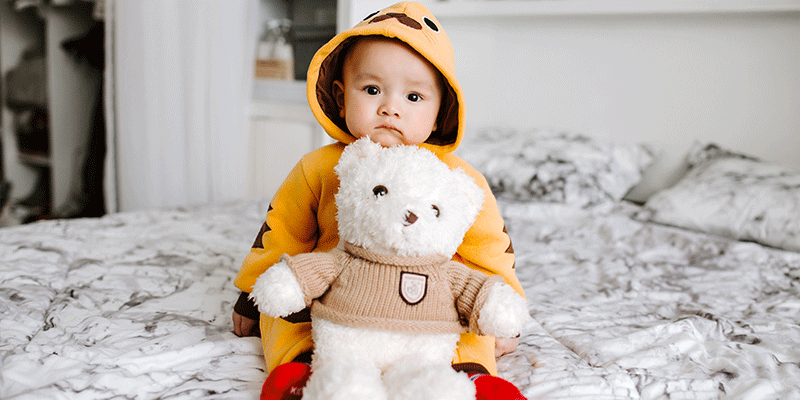
How long should you expect this separation anxiety to last? It usually peaks between ten and eighteen months and then fades during the last half of the second year. In some ways, this phase of your child’s emotional development will be especially tender for both of you, while in others, it will be painful. After all, her desire to be with you is a sign of her attachment to her first and greatest love—namely you. The intensity of her feeling as she hurtles into your arms is irresistible, especially when you realize that no one—including your child herself—will ever again think you are quite as perfect as she does at this age. On the other hand, you may feel suffocated by her constant clinging, while experiencing guilt whenever you leave her crying for you. Fortunately, this emotional roller coaster eventually will subside along with her separation anxiety. But in the meantime, try to downplay your leave-taking as much as possible. Here are some suggestions that may help.
Your baby is more susceptible to separation anxiety when she’s tired, hungry, or sick. If you know you’re going to go out, schedule your departure so that it occurs after she’s napped and eaten. And try to stay with her as much as possible when she’s sick.
Don’t make a fuss over your leaving. Instead, have the person staying with her create a distraction (a new toy, a visit to the mirror, a bath). Then say goodbye and slip away quickly.
Remember that her tears will subside within minutes of your departure. Her outbursts are for your benefit, to persuade you to stay. With you out of sight, she’ll soon turn her attention to the person staying with her.
Help her learn to cope with separation through short practice sessions at home. Separation will be easier on her when she initiates it, so when she crawls to another room (one that’s baby-proofed), don’t follow her right away; wait for one or two minutes. When you have to go to another room for a few seconds, tell her where you’re going and that you’ll return. If she fusses, call to her instead of running back. Gradually she’ll learn that nothing terrible happens when you’re gone and, just as important, that you always come back when you say you will.
If you take your child to a sitter’s home or a child care center, don’t just drop her off and leave. Spend a few extra minutes playing with her in this new environment. When you do leave, reassure her that you’ll be back later.
If your child has a strong, healthy attachment to you, her separation anxiety probably will occur earlier than in other babies, and she’ll pass through it more quickly. Instead of resenting her possessiveness during these months, maintain as much warmth and good humor as you can. Through your actions, you’re showing her how to express and return love. This is the emotional base she’ll rely on in years to come.
Last Updated 8/1/2009
Source Caring for Your Baby and Young Child: Birth to Age 5 (Copyright © 2009 American Academy of Pediatrics)
The information contained on this Web site should not be used as a substitute for the medical care and advice of your pediatrician. There may be variations in treatment that your pediatrician may recommend based on individual facts and circumstances.






